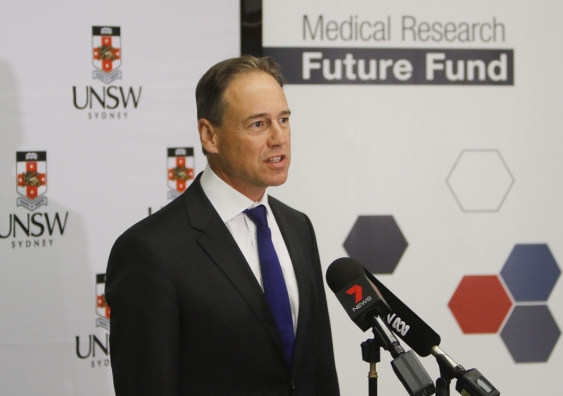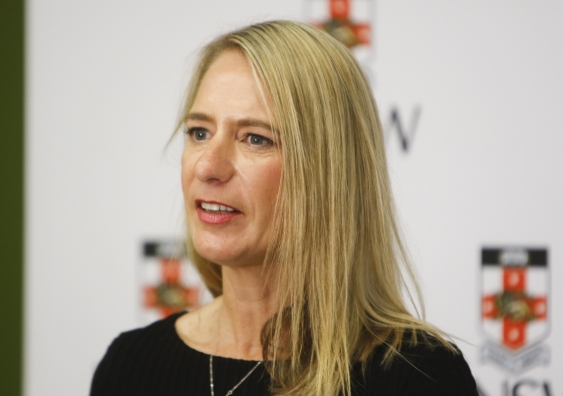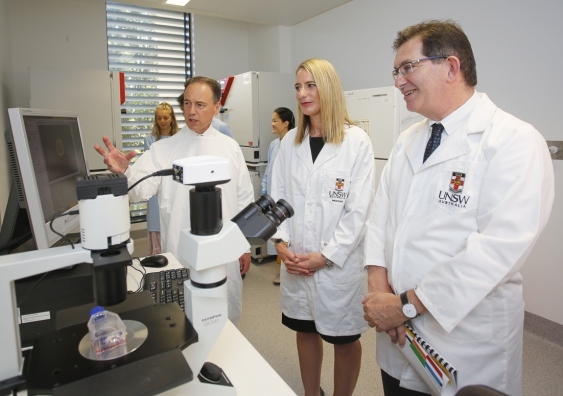A clinical trial of a new immunotherapy that will deliver a “toxin bomb” to brain cancer cells was one of two UNSW medical projects to receive funding announced by Federal Health Minister Greg Hunt at UNSW on Wednesday.
The project to treat the lethal brain cancer glioblastoma, led by Associate Professor Kerrie McDonald, will receive a grant of $1.4 million under the government’s rare diseases clinical trials program.
Mr Hunt said glioblastomas presented one of the “most agonising” diagnoses, because average survival time is less than 15 months, but the UNSW research offered hope.
“This is about an amazing technology – the use of immunotherapies coupled with toxins to try to treat, and prevent relapse, of brain cancer.”
Another UNSW project, led by Professor Ian Harris, will receive $910,000 to determine the effectiveness and safety of using aspirin, compared with injections of the more expensive drug heparin, to prevent blood clots after hip and knee replacements.
Last year, the federal government established a one-off grant of $13 million to its Medical Research Future Fund’s Rare Cancers, Rare Diseases and Unmet Needs Clinical Trials Program.
In a major funding boost announced at the press conference at UNSW, Mr Hunt said that the quality and number of applications for this funding had been so high the government had decided to make it a permanent annual program. Another $10 million funding round for rare cancers and rare diseases with low survival rates will be held in late February.

Federal Minister for Health Greg Hunt at UNSW. Photo: Quentin Jones
“The initial $13 million will become a $69 million program over the course of three years and we will extend it further beyond that at budget time,” he said.
“This is about giving hope and solutions for families facing the most difficult circumstances. It’s about saving lives.”
Mr Hunt also toured the Cure Brain Cancer Neuro-Oncology Laboratory at UNSW with President and Vice-Chancellor Professor Ian Jacobs and Associate Professor McDonald.
“We are absolutely thrilled that we are getting funding to run a cutting-edge, novel immunotherapy program,” Associate Professor McDonald said.
“Hope is a big deal for patients. Unfortunately, the diagnosis of brain cancer may be a hopeless situation for many. Glioblastoma is uniformly lethal, and these tumours now represent the most frequent cause of cancer death in children and young adults.”

UNSW Associate Professor Kerrie McDonald. Photo: Quentin Jones
She said that more than 90% of brain tumours contain a common virus called cytomegalovirus, or CMV – a member of the herpes family.
“We are tapping into that. What we have developed is a peptide that goes into the brain, binds to the CMV and then drops a toxin bomb that’s going to clean up the tumour.
“We’re also boosting the immune system. We’re using a tetanus shot. One of the biggest issues for brain cancer patients is that the tumour comes back. We are confident this treatment is going to work.”
Thirty patients with newly diagnosed glioblastoma will be recruited for a Phase 1 clinical trial of the UNSW therapy, which has been developed in collaboration with Duke University in the US.
In a trial run by Duke University using a different form of immunotherapy that also targeted CMV, the patients survived for more than 40 months, Associate Professor McDonald said: “Patients need to know that everyone is working desperately hard to find cures and find treatments.”




